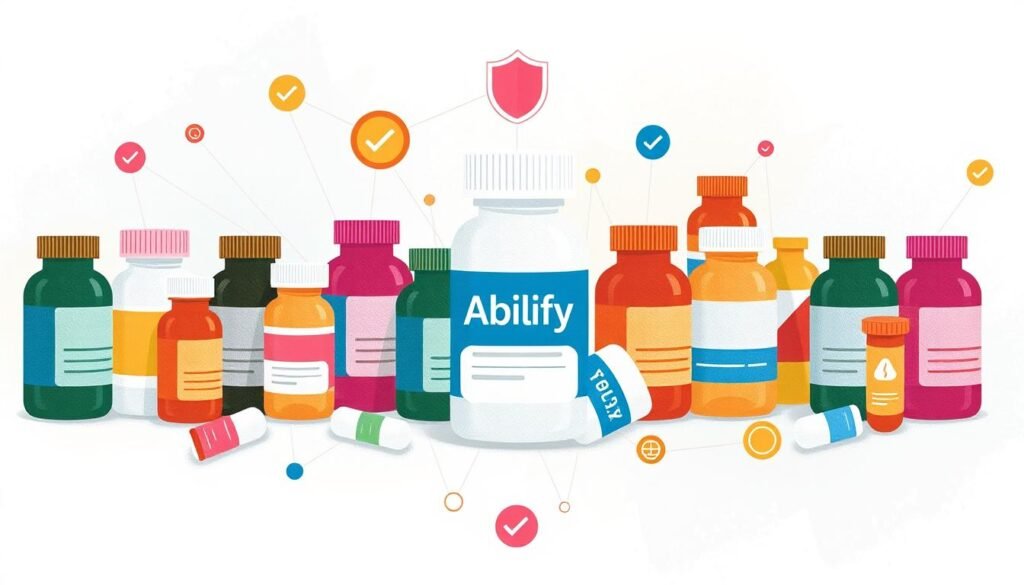About 16% of adults in the US use a psychotropic drug, like Abilify, for mental health. Known as aripiprazole, Abilify treats schizophrenia and depression effectively. However, it’s important to know the safety of mixing Abilify with other drugs.
Not all medicines work well together. Bad combinations can cause unwanted side effects or make the treatment less effective. This guide will help you understand these drug interactions. It aims to ensure safe use of medications.
Key Takeaways
- Abilify is FDA-approved for conditions including schizophrenia and depression.
- Combining Abilify with certain medications can increase the risk of side effects or reduce effectiveness.
- Awareness of potential drug interactions is vital for medication safety.
- Alcohol consumption may worsen Abilify side effects, despite its general safety.
- Healthcare professionals may recommend dosage adjustments based on medication interactions.
Understanding Abilify and Its Uses
Aripiprazole, or Abilify, is well-known in mental health treatment. It treats many conditions, like schizophrenia, bipolar I disorder, and autism. It’s also used with antidepressants for depression. This makes it valuable for those dealing with major depression.
The way aripiprazole works is by balancing dopamine and serotonin in the brain. Balancing these chemicals is key for treating mood disorders. Knowing how and when to use Abilify is crucial for the best treatment results.
Abilify isn’t just for adults. It’s also prescribed for children as young as 6 for certain conditions. Patients should always talk to their doctors about all medications to avoid drug interactions.
While aripiprazole offers many benefits, be aware of possible side effects. Some might experience allergic reactions or severe conditions like neuroleptic malignant syndrome. Common side effects include drowsiness and weight gain. Always consult a healthcare professional if symptoms worsen.
| Condition | Abilify’s Role |
|---|---|
| Schizophrenia | Treats hallucinations and improves mental clarity. |
| Bipolar I Disorder | Helps regulate mood swings and emotional stability. |
| Autism Spectrum Disorder | Aids in reducing irritability associated with the condition. |
| Tourette Disorder | Reduces the frequency of tics. |
| Depression | Used as an adjunct treatment with antidepressants. |
In conclusion, aripiprazole is a key option for mental health treatment. It treats different disorders well when risks and benefits are weighed. Talking regularly with healthcare providers improves treatment and safety.
Potential Risks of Combining Medications
When you mix medications, like Abilify, you have to think hard about the risks. One drug can change how another works. This change can lead to more side effects or make the drug work less well. For example, drugs for psychosis like haloperidol and clozapine can react with many others. Haloperidol can mix with as many as 58 different medications. Mixing drugs can be extra risky if you’re taking several at once, especially for the same health issue.
It’s key to know the contraindications before starting Abilify. Some health conditions mean you shouldn’t use it. For example, mixing anticholinergic drugs and Clozaril can cause constipation. And, tricyclic antidepressants might lead to heart problems if taken with schizophrenia meds. This shows why doctors must review all meds before adding Abilify to the mix.
Your lifestyle also affects how safe your medication is. Drinking alcohol with antipsychotics can make you much sleepier. This can be dangerous if you need to drive or use machines. Caffeine can up the levels of Clozaril in your blood, messing with your treatment. Grapefruit juice boosts the power of lots of antipsychotic drugs. This raises concerns about mixing Abilify with certain foods and drinks.
No two patients are the same. This means each person needs a special plan to avoid drug mix-ups. Talking it over with your doctor can help dodge bad reactions. This keeps your treatment both safe and on track.
https://www.youtube.com/watch?v=ge3TC-xGr9E&pp=ygUcI3BhcnRzb2ZhdHlwaWNhbHByZXNjcmlwdGlvbg%3D%3D
| Medication Combination | Potential Risk |
|---|---|
| Abilify + Alcohol | Increased drowsiness |
| Clozapine + Anticholinergic Drugs | Constipation |
| Tricyclic Antidepressants + Schizophrenia Medications | Irregular heartbeats |
| Fluoxetine + Aripiprazole | Increased plasma concentrations |
| Grapefruit Juice + Antipsychotics | Elevated blood levels |
| Opioids + Antipsychotics | Extreme drowsiness |
Combining Abilify with Other Medications
When you think about mixing Abilify with other meds, it’s key to know about drug interactions. Abilify is approved by the FDA to treat mental health issues like schizophrenia and depression. It can react poorly with some drugs, foods, and supplements.
Specific strong inhibitors, for example, itraconazole and ketoconazole, may increase side effect risks. Meanwhile, strong inducers like carbamazepine and phenytoin can lower Abilify’s power.
Overview of Drug Interactions
Abilify can interact with different medications, raising the chance of bad effects. Benzodiazepines, like alprazolam and lorazepam, can make side effects like drowsiness worse. Also, certain antidepressants, such as fluoxetine and paroxetine, can boost side effects. Mixing Abilify with blood pressure drugs, like doxazosin, might lead to more severe low blood pressure problems. Knowing about these interactions is critical for safe medication use.
Importance of Medication Safety
Medication safety with Abilify means keeping a close eye on things and talking to health pros. Spotting potential problems early can help avoid bad reactions and make the treatment better. Patients should always report any side effects, especially when taking Abilify with other meds. Staying on top of interactions is key for a safer, more effective treatment journey.
Common Drug Interactions with Abilify
It’s important to know how Abilify works with other medicines. Mixing it with certain drugs can affect its power and safety. Look out for interactions with antidepressants and antipsychotic meds.
Antidepressants and Abilify Interaction
Abilify and specific antidepressants like fluoxetine or paroxetine can be a tricky combination. They might slow down the breakdown of aripiprazole. This can make the drug’s level in your body too high, causing unwanted reactions.
Patients may feel extra sleepy or have other negative symptoms. It is critical to keep a close eye on these effects. This helps in dealing with any bad reactions fast.
Antipsychotic Medications Interaction
Taking Abilify with other antipsychotic drugs, for example, quetiapine, poses a risk. It can lead to more side effects, such as feeling very drowsy and experiencing low blood pressure. This calls for careful oversight to avoid troubles.
Doctors must review all the medicines a patient takes. This includes any antipsychotic drugs. They do this to lower the chances of bad interactions with Abilify.

| Medication Type | Possible Interactions | Symptoms to Monitor |
|---|---|---|
| Antidepressants | Slowed metabolism of Abilify | Increased sedation, nausea, dizziness |
| Antipsychotic Medications | Enhanced sedative effects | Low blood pressure, fainting, confusion |
Combining Abilify with Blood Thinners
Mixing Abilify with blood thinners can be risky. There’s a link between taking Abilify and more chances of major bleeding events. This happens when it’s used with non-vitamin K oral anticoagulants, also known as NOACs. A big study followed 98,863 patients. They had a condition called non-valvular atrial fibrillation. The study found 8,037 major bleeds across 705,521 person-quarters of taking NOACs.
What’s worrying is that 26.35% of those on NOACs also took antipsychotics. Some drugs, like chlorpromazine and quetiapine, make bleeding more likely when mixed with NOACs. The mix of Abilify and these medicines might make blood thinners work too well.
People using blood thinners need to talk with doctors about all drugs they take. This can help with safe monitoring and dose changes. Knowing the dangers of mixing Abilify with blood thinners is key to avoid serious problems.
| Medication Type | Risk of Major Bleeding |
|---|---|
| NOACs | Increased risk when combined with Abilify |
| Typical Antipsychotics | Higher adjusted incidence rates |
| Atypical Antipsychotics | Significant risk increases |
Effects of Combining Abilify with CNS Depressants
Taking Abilify with CNS depressants can raise the risk of sedation and other side effects. CNS depressants are medicines like benzodiazepines and opioids. When combined with Abilify, they might make you feel very sleepy and affect your thinking. It’s important to know these risks to use the medications safely.
Risk of Increased Sedation
The use of Abilify and CNS depressants together can lead to more sedation. This can make it hard to do daily tasks because of extreme sleepiness. It’s vital to watch for too much sedation since Abilify and some CNS depressants increase each other’s sedative effects.
Monitoring and Adjustments
Doctors should closely watch patients using Abilify with CNS depressants. They may need to check often to see if the treatment is safe and effective. Sometimes, doctors might have to change doses to lessen severe side effects and keep patients safe.
| Medication Type | Examples | Effects of Combination |
|---|---|---|
| CNS Depressants | Benzodiazepines, Opioids | Increased sedation and impaired cognitive function |
| Abilify | Aripiprazole | Potential for exacerbating CNS depressant effects |

Cytochrome P450 Enzymes and Abilify Interactions
Cytochrome P450 enzymes play a key role in how drugs mix and work in our bodies. Specifically, CYP3A4 and CYP2D6 enzymes help break down Abilify (aripiprazole) in our liver. Changes in how these enzymes work can greatly change Abilify’s levels in our blood. This affects how well the drug works and its side effects.
Understanding the Role of CYP3A4 and CYP2D6
CYP3A4 and CYP2D6 are important when looking at how Abilify works with other drugs. For example, when certain drugs, like ketoconazole, block CYP3A4, Abilify’s level in the blood can go up a lot. Taking ketoconazole with Abilify made Abilify’s blood level rise by 63%. This can increase the chance of unwanted effects.
On the other side, drugs like carbamazepine that boost enzyme activity can lower Abilify’s effect. They can cut down Abilify’s peak level and overall presence in the blood by about 70%. This shows why it’s important to watch how patients react when starting such drugs.
Also, CYP2D6’s effect on Abilify is big. Drugs that strongly block CYP2D6, like paroxetine, can greatly reduce Abilify’s clearance from the body for some people. This big impact highlights the need to check the patient’s drug list and genetic makeup before starting Abilify.
Doctors need to be careful when mixing Abilify with other medicines because of these enzyme interactions. For more details on these interactions, you can look at the full information available here.
Preventing and Managing Side Effects of Abilify
Managing the side effects of Abilify is key for your health while being treated. Knowing the common side effects helps patients spot and report changes quickly. Even though many people handle the medication well, side effects that need attention can still happen.
Common Side Effects to Monitor
Be on the lookout for these side effects if you’re taking Abilify:
- Nausea
- Dizziness
- Fatigue
- Weight gain
- Restlessness
- Insomnia
- Changes in cholesterol or blood sugar levels
These side effects can differ in how strong they are and how long they last. Sometimes, they may go away on their own. Other times, treatment changes might be needed.
When to Contact Your Doctor
Knowing when to call your doctor about symptoms is important. You should reach out right away if you have:
- Severe dizziness or unexpected sedation
- Rash or signs of an allergic reaction
- Big changes in mood or behavior
- Tremors and stiffness, known as extrapyramidal symptoms
- Common but persistent stomach issues like nausea or vomiting
- Signs of metabolic syndrome, such as increased thirst or changes in how hungry you feel
- Withdrawal symptoms when stopping the medication
Talking openly with your healthcare provider can help tailor your monitoring. This ensures a safer experience with your treatment.

Guidelines for Concurrent Medication Use
Managing medications is key for those with long-term conditions like schizophrenia. Guidelines for concurrent medication use are crucial. Many times, a single antipsychotic doesn’t fully work. This makes combining medications an important strategy.
It’s critical to practice safe medication management. Keeping an up-to-date medication list helps avoid bad interactions. Patients should talk openly with their healthcare teams. This includes discussing over-the-counter drugs and supplements. Watching for side effects when starting new treatments is also key.
Doctors often suggest lowering doses of medications like aripiprazole when combined with fluoxetine or paroxetine, especially if there might be moderate interactions. This approach can make treatments more effective and safer.
For more insights into managing multiple antipsychotic drugs and guidelines, see this research study. It stresses the need for careful monitoring and more studies to improve medication management.
Conclusion
Mixing Abilify with other drugs needs careful thought and a deep understanding of drug interactions. Approved by the FDA in 2002, Abilify is key in treating mental health issues. Yet, using it with other drugs must be done cautiously, following medication safety guidelines.
Good communication between patients and doctors is crucial. It helps manage using multiple medications safely. Being aware of the risks of using Abilify with other drugs is essential. This awareness helps tailor treatment plans to reduce bad effects. Also, watching for side effects carefully is critical, especially with Abilify’s serious warnings.
Taking a proactive stance in medication management improves treatment results. Knowing about the special risks of combining Abilify with other medications allows patients to make smart choices about their mental health care.